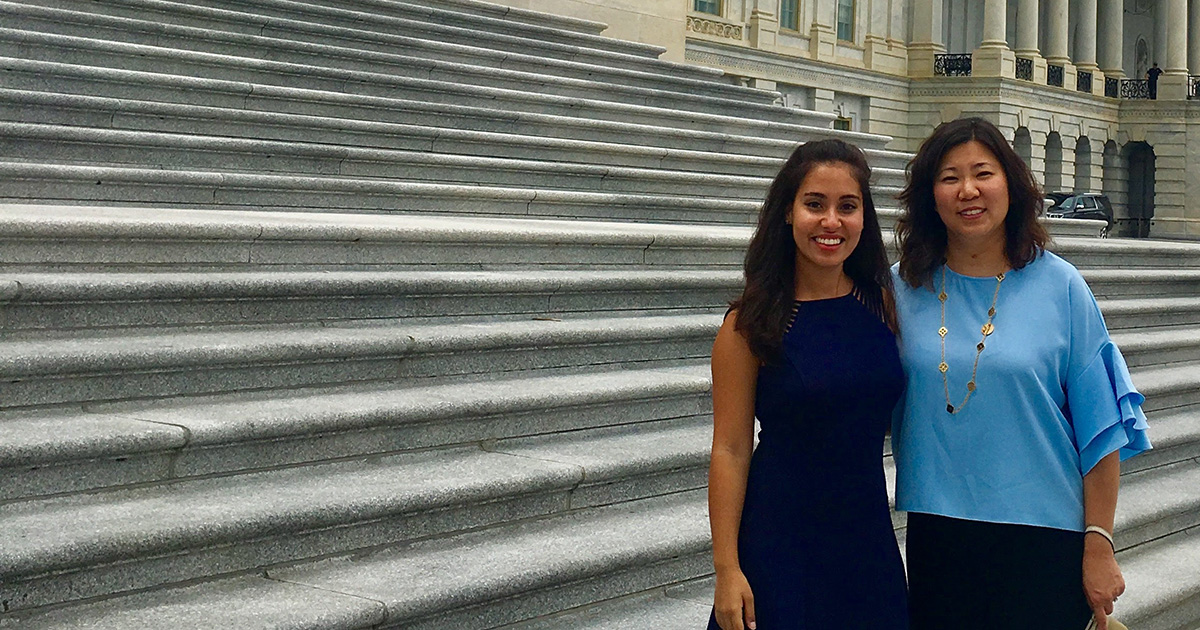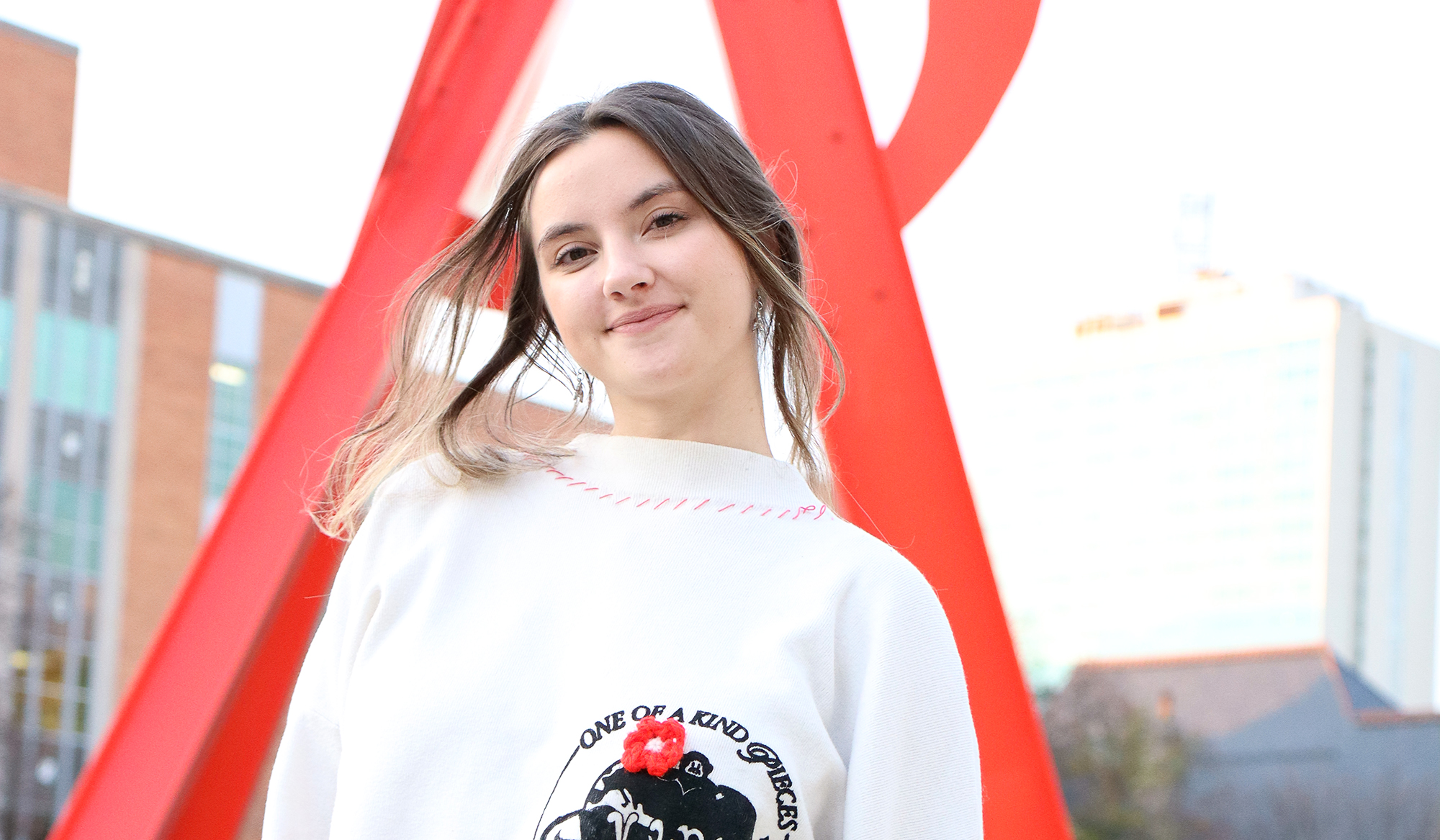Gloriela Iguina-Colon faced a difficult decision in choosing which college to attend. Her first choice was Michigan, but the high out-of-state tuition would have saddled her with a huge amount of debt. At the same time, a college near her home in New York offered a free ride. Then she heard about the Alumni Association’s LEAD Scholars program, which provided not only financial assistance, but a community of fellow students as well as alumni mentors.
Today, she is a senior in the Ford School of Public Policy, having just completed an internship in Washington, D.C., which she secured through the LEAD program. She tells Michigan Alumnus her story.
Why Michigan?
I didn’t want to be in a city anymore. I wanted to be on a campus and take advantage of the opportunities at Michigan. My mother and I visited, and my mom said yes, even though it was going to be a big financial burden. She thought it was worth it. (After exploring different financial options), the Office for Institutional Equity put us in contact with LEAD. At Michigan, everything fell into place, academically, socially, and financially.
You had an internship last summer in Washington, D.C., with U.S. Rep. Grace Meng, ’97. How did that experience affect your professional development?
It restored my faith in democracy. I answered every letter, every call from constituents. Before that, I sometimes wondered, “Why contact their office?” (I discovered that) representatives ask, “How many people have called about this issue today?” It made me hopeful l that if I do go into politics, the community you represent and policymaking can be very connected.
I also learned the difference between politics and policy. The policy can be amazing, but if you don’t know how to tap into (available) resources, you won’t get it passed. Even though I wasn’t making any real decisions as an intern, I didn’t want to think “I’m just an intern. I’m just here to do phone calls and write up memos.” There are things I would agree with the congresswoman about, and there are things I would disagree about. I’m glad I learned that before I go into the workforce. In politics, it can be hard to have a backbone and integrity and keep your identity in the process. My mom taught me to be strong in who you are and grounded in your values.
The fact that these internships are unpaid limits students from marginalized communities. That’s one thing I would change. The Ford school was extremely helpful with funding. They have funds to support students up to $1,000.
You graduate in the spring. What’s next?
I will be going to grad school, but I want to get experience first. The internship (showed me) there’s nothing like doing something to know if you want to do it long term. I’ve been involved since I was 13 with refugee rights and community work. I want to improve access to health care for the immigrant population. I was able to explore that in my internship. I did a report on a policy to ameliorate problems. I read research papers by health care advocacy groups. My Ford education helped me learn how to do that. I liked putting that to use.
What would you say to students about to participate in an internship?
I would encourage them to attend events that interest them—and even some they’re not super passionate about. At the end of the day, everything connects. Soak up as much information as you can without getting burned out. Don’t get intimidated by networking talk. …
I met this amazing man at a museum event, a pioneer who worked for Adam Clayton Powell. I was with another intern who was not tuning in that much. It’s so drilled in our heads that we have to meet people who will get us jobs that we can forget there are so many people who have amazing stories to tell, who might be big “aha” moments for us. Always keep your values at the forefront and don’t always think “How will this get me to the next thing?” Anything can lead to bigger things. You never know.
Gloriela Iguina-Colon’s internship was just one of many professional experiences that LEAD Scholars had this summer. Following are other programs and organizations where these students expanded their Michigan experience and networks.
• Air Force Research Laboratory, Dayton, Ohio
• Air Force Research Laboratory, Eglin AFB, Florida
• Chicago Park District, Chicago, Illinois
• Clorox, Kennesaw, Georgia
• Democratic Party of Georgia, Atlanta, Georgia
• Environmental Protection Agency, Ann Arbor, Michigan
• Google Engineering Practicum, Mountain View, California
• Hope App and Moviestar, San Francisco, California, and Bogota, Colombia
• The Mann House, Concord, Michigan
• Monarch Wealth and Business Management, New York, New York
• Morgan Stanley, Private Wealth Management, Bethesda, Maryland
• National Center for Children and Families, Bethesda, Maryland
• Project Genesis, Detroit, Michigan
• Summer Undergraduate Research Experience at Georgia Tech, Atlanta, Georgia
• Target, Minneapolis, Minnesota
• The TEAM Companies, Brooklyn, New York
• 2×4 (global design consultancy), New York, New York
• U-M Detroit Community Based Research Program, Detroit, Michigan
• U-M LSA-CSP Summer Bridge Program, Ann Arbor, Michigan
• U-M School of Public Health, Ann Arbor, Michigan
• U-M Undergraduate Research Opportunity Program, Ann Arbor, Michigan
• Wintrust Mortgage, Quality Control Department, Rosemont, Illinois
Davi Napoleon, ’66, MA’68, is a freelance writer based in Ann Arbor.
To find out how you can help support LEAD Scholars with internship opportunities, email [email protected] or call 800.847.4764. If you are interested in learning more about the LEAD Scholars Program, visit umalumni.com/LEAD.





